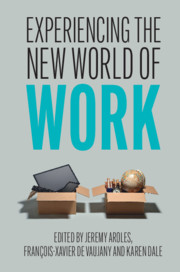Book contents
- Experiencing the New World of Work
- Experiencing the New World of Work
- Copyright page
- Contents
- Tables
- Contributors
- Foreword
- Introduction
- Part I Experiencing at Work
- Part II Digital Platforms and the New World of Work
- Part III Politics, Imaginaries and Others in the New World of Work
- 8 Bypassing the Stage of Copper Wire?
- 9 Critical Theory and the Post-work Imaginary
- 10 Exploring the New in Politics at Work
- Conclusion
- Afterword
- Index
- References
9 - Critical Theory and the Post-work Imaginary
from Part III - Politics, Imaginaries and Others in the New World of Work
Published online by Cambridge University Press: 24 December 2020
- Experiencing the New World of Work
- Experiencing the New World of Work
- Copyright page
- Contents
- Tables
- Contributors
- Foreword
- Introduction
- Part I Experiencing at Work
- Part II Digital Platforms and the New World of Work
- Part III Politics, Imaginaries and Others in the New World of Work
- 8 Bypassing the Stage of Copper Wire?
- 9 Critical Theory and the Post-work Imaginary
- 10 Exploring the New in Politics at Work
- Conclusion
- Afterword
- Index
- References
Summary
Advances in production systems and technology, particularly around automation and robotics, have been accompanied in recent years by a resurgence of debate about the future of work. Many contemporary accounts inhabit a utopian space where radical change is desired and envisioned. They point to profound, possibly revolutionary change in the nature of work – perhaps the end of work. They place work at the centre of social life as presently known, and in so doing tend to offer up a critique of capitalist society in toto. During the twentieth century, Western economies grappled with the issue of automation, at the same time finding themselves oscillating between consumer-fuelled expansion and economic crisis. This produced an intellectual engagement with automation and post-work which has much in common with that of today’s ‘postindustrial utopians’. Even stretching back into antiquity, utopian thinkers imagined a world without toil, and so the notion of ‘post-work’, or the ‘end of work’ exists in the context of a long and distinctive intellectual heritage. This chapter presents an analysis of this intellectual heritage and seeks to illustrate continuity and disjuncture in the dynamics of what could be termed ‘post-work imaginaries’.
- Type
- Chapter
- Information
- Experiencing the New World of Work , pp. 204 - 226Publisher: Cambridge University PressPrint publication year: 2021
References
- 4
- Cited by

